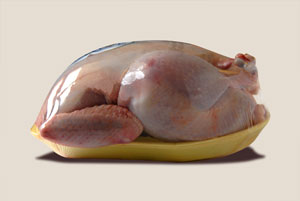 Recent studies have shown antibiotic-resistant strains of bacteria, such as MRSA, are in nearly half of the United States’ meat supply. The dangers of this have been shouted by followers of the organic movement for years.
Recent studies have shown antibiotic-resistant strains of bacteria, such as MRSA, are in nearly half of the United States’ meat supply. The dangers of this have been shouted by followers of the organic movement for years.
It’s reasonably argued that this event is a culmination of factory farms. On farms where livestock is kept in cramped quarters and antibiotics are overused, bacteria is given the perfect environment to thrive, mutate and gain resistance.
Scientific research needs to continue on this topic but as of now, there doesn’t seem to be any reason to swear off meat altogether. It’s believed that, although the bacteria is present, it doesn’t typically transfer to humans during consumption. However, it’s really not that simple.
Dr. Guy Loneragan, an epidemiologist and professor of food safety and public health at Texas Tech University, is concerned with the well-being of humans and animals alike. He explained that people on all levels of the “production chain” are responsible for ensuring food safety.
One major step in the chain is food preparation. Research suggests that properly handling and cooking food destroys the dangerous bacteria in question. While reassuring, this information comes with a disclaimer. Despite all the best sanitation efforts during food preparation, it may still be possible for resistant strains of bacteria to be passed from the animals to the keepers who care for them, thus perpetuating a risk of disease among the general population. This is where the importance of eliminating these microorganisms comes in.
 “Food safety is a team effort that includes people all along the production chain- from producers, to those at harvest and processing, to how we store, prepare, and cook the food,” Loneragan said, “We know that it is possible for bacteria to still pass along the chain so we are researching ways to reduce and eliminate these bacteria…we need to critically evaluate antibiotic use on a case by case basis to make sure that those uses do not deleteriously impact public health.”
“Food safety is a team effort that includes people all along the production chain- from producers, to those at harvest and processing, to how we store, prepare, and cook the food,” Loneragan said, “We know that it is possible for bacteria to still pass along the chain so we are researching ways to reduce and eliminate these bacteria…we need to critically evaluate antibiotic use on a case by case basis to make sure that those uses do not deleteriously impact public health.”
So what do we do? For starters, we should consider buying meat and dairy that’s raised without the use of antibiotics as a preventive measure among livestock. The use of antibiotics, in most cases, is not a reasonable course of preventive medicine. As we can see, it seems to cause more harm than good.
One thing that we know, for sure, is that proper food handling is vital. As a refresher, take a look at some of our Diets in Review guides for proper food handling:
Protect Your Family Against Food Borne Illness
Avoid Illness with Food Safety
Via Health.com
